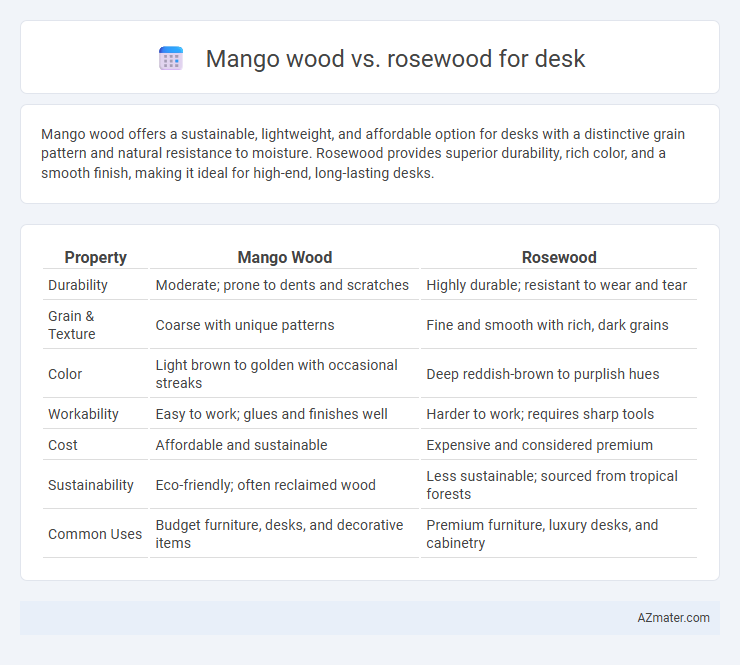Mango wood offers a sustainable, lightweight, and affordable option for desks with a distinctive grain pattern and natural resistance to moisture. Rosewood provides superior durability, rich color, and a smooth finish, making it ideal for high-end, long-lasting desks.
Table of Comparison
| Property | Mango Wood | Rosewood |
|---|---|---|
| Durability | Moderate; prone to dents and scratches | Highly durable; resistant to wear and tear |
| Grain & Texture | Coarse with unique patterns | Fine and smooth with rich, dark grains |
| Color | Light brown to golden with occasional streaks | Deep reddish-brown to purplish hues |
| Workability | Easy to work; glues and finishes well | Harder to work; requires sharp tools |
| Cost | Affordable and sustainable | Expensive and considered premium |
| Sustainability | Eco-friendly; often reclaimed wood | Less sustainable; sourced from tropical forests |
| Common Uses | Budget furniture, desks, and decorative items | Premium furniture, luxury desks, and cabinetry |
Introduction to Mango Wood and Rosewood
Mango wood, derived from the mango tree, is a sustainable hardwood known for its durability and attractive grain patterns, making it a popular choice for eco-friendly furniture including desks. Rosewood, sourced from several species within the Dalbergia genus, is prized for its rich, deep color and natural oils that enhance resistance to insects and decay, often used in high-end desks for its aesthetic appeal and longevity. Both woods offer unique benefits, with mango wood providing a cost-effective, environmentally conscious option and rosewood delivering premium strength and luxurious finish.
Appearance and Aesthetics Comparison
Mango wood features a light, golden-yellow hue with naturally occurring unique grain patterns and occasional knots, lending a rustic and organic aesthetic to desks. Rosewood, known for its rich, dark reddish-brown tones and smooth, dense grain, imparts a luxurious, polished look often associated with high-end furniture. The contrasting appearances make mango wood ideal for casual, earthy designs, while rosewood suits elegant, traditional desk styles.
Durability and Strength Differences
Mango wood offers moderate durability and a dense grain structure, making it resistant to warping and cracking, ideal for lightweight to medium-use desks. Rosewood, known for its exceptional hardness and natural oils, provides superior strength and resistance to scratches and dents, ensuring long-lasting durability for heavy-use furniture. The high density and resilience of rosewood make it more suitable for premium desks requiring enhanced sturdiness compared to mango wood.
Sustainability and Environmental Impact
Mango wood is a fast-growing, renewable resource that supports sustainable forestry practices, making it an environmentally friendly choice for desks. Rosewood grows much slower and is often harvested from endangered species, contributing to deforestation and ecological imbalance. Choosing mango wood helps reduce carbon footprint and preserves biodiversity compared to the high environmental impact associated with rosewood furniture.
Price and Affordability
Mango wood offers a budget-friendly option for desks, typically priced lower than rosewood due to its faster growth and abundant supply. Rosewood, known for its rich color and durability, commands a higher price, making it a premium choice for luxury desks. Choosing mango wood provides affordability without significant compromise on strength, while rosewood investment often reflects exclusivity and long-term value.
Workability and Ease of Crafting
Mango wood offers excellent workability due to its medium density and smooth grain, making it easier to cut, shape, and finish for desks. Rosewood, denser and harder, requires more skill and specialized tools for crafting, but results in a highly durable and polished surface. Both woods provide strong structural integrity, but mango wood's ease of handling makes it ideal for intricate designs and rapid production.
Maintenance and Care Requirements
Mango wood desks demand regular oiling and a soft cloth wipe to maintain their natural moisture and prevent cracking, while rosewood requires careful polishing and avoidance of harsh chemicals due to its dense grain and oily texture. Both woods benefit from avoiding direct sunlight to prevent discoloration, but rosewood's higher natural oil content makes it more resistant to stains and warping. Proper humidity control extends the lifespan of mango wood, whereas rosewood's durability reduces frequent maintenance needs, making it ideal for long-term use.
Resistance to Pests and Decay
Mango wood offers moderate resistance to pests and decay but typically requires proper sealing and treatment to enhance durability when used for desks. Rosewood is naturally more resistant to pests and decay due to its dense grain and inherent oils, making it a long-lasting choice for high-quality furniture. Choosing rosewood ensures better protection against termite damage and fungal decay, contributing to the desk's longevity.
Weight and Portability of Desks
Mango wood desks are generally lighter and easier to move, making them highly portable for flexible workspace arrangements. Rosewood desks, known for their density and durability, tend to be significantly heavier, which can limit portability but offers enhanced stability. Choosing between these materials depends on the balance desired between weight and ease of relocation in office or home settings.
Which Wood is Best for Your Desk?
Mango wood offers a lightweight, eco-friendly option with a distinctive grain and excellent durability for desks, making it ideal for sustainable furniture lovers. Rosewood, prized for its rich color, natural oils, and exceptional hardness, provides a luxurious, long-lasting surface that resists scratches and moisture. Choosing between mango wood and rosewood depends on your preference for sustainability and unique grain patterns versus premium durability and classic elegance.

Infographic: Mango wood vs Rosewood for Desk
 azmater.com
azmater.com